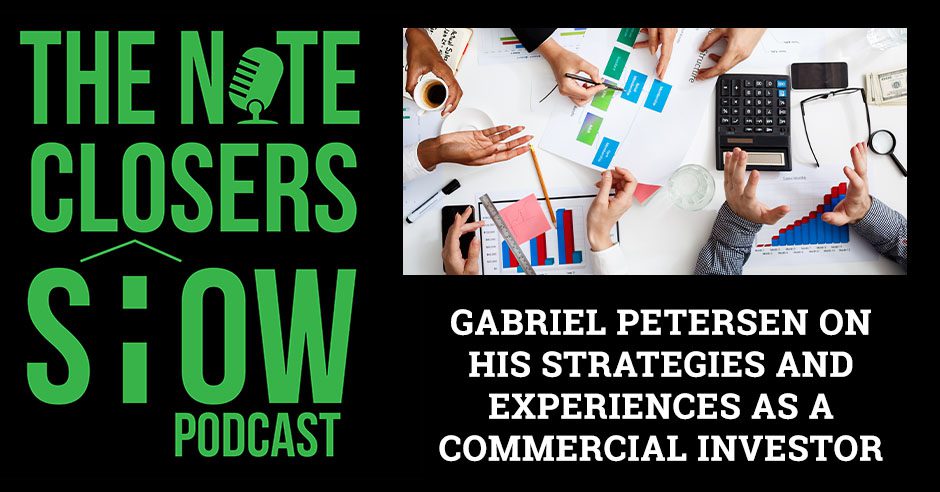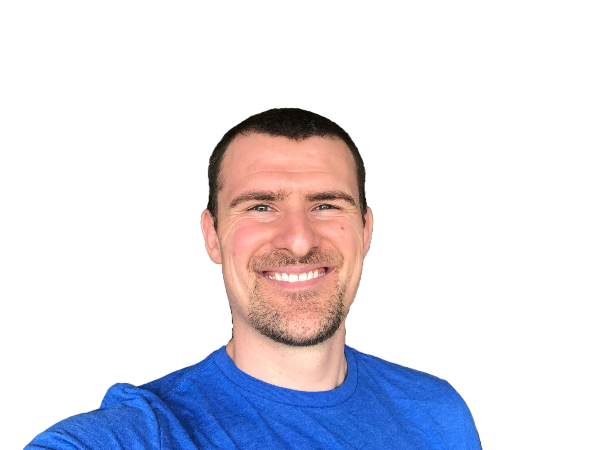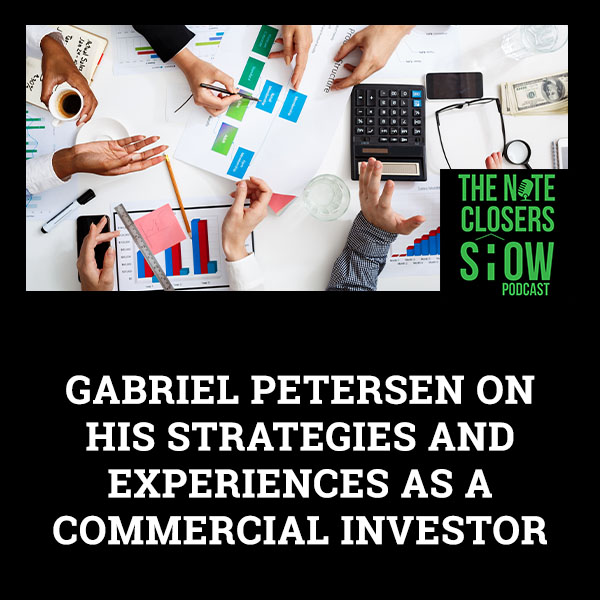
Starting low in real estate is a great way to establish your focus and gather excellent deals you can give a lot of time into. Scott Carson sits down with Gabriel Petersen from the Real Estate Investing Club podcast to share his journey as a commercial investor and how he went from wanting to be a lawyer to discovering real estate. Gabe shares his winding path from residential fix and flipper to commercial real estate investing with RV parks and self-storage facilities across the country. He also explains how he utilizes his podcast not only to share valuable real estate advice with his audience but also to expand his network virtually, especially in the middle of the restrictive pandemic.
—
Watch the episode here
Listen to the podcast here
Gabriel Petersen On His Strategies And Experiences As A Commercial Investor
This is Gabe Peterson from The Real Estate Investing Club. I’m on here with Scott Carson on We Close Notes. I’m super excited to tell you my story going from broke, no idea where I was going, to owning multiple commercial real estate properties. I hope you enjoy it.
—
I’m excited to have our special guest. Our rockstar guest is doing a lot of amazing things. Out of the sunny Pacific Northwest, he is the Owner of Kaizen Properties and Honeycrisp Self-Storage. He is also the host of another popular show that you guys should also check out called The Real Estate Investing Club Podcast. I was honored to be a guest on his show, and we had such a great time that I had to have him on ours.
Share some of his knowledge, experience and help pick his brain because many of you guys are out are not only investing in distress debt, but looking for other properties. We are going to see a lot of opportunities here in the New Year. I’m excited to have the man, the myth, the investing legend, Mr. Gabe Petersen, joining us. Gabe, how are you doing?
I’m awesome, Scott. That was quite the introduction. I appreciate it.
Tell us a little bit about yourself. How did you get into real estate investing? What were doing beforehand? We’ll go that route and wander along these crazy deals.
My story is very non-linear, which I feel like many people’s story is. The people that are in real estate, start out in one direction, they make a turn here and make a turn there and end up in the real estate, and that’s exactly what happened to me. I’m going to go way back to college. I graduated at UDaB with a degree in Philosophy, which is the one degree that has absolutely no value once you get into that real world.
The goal was to go to law school. I had some family and friends who were lawyers. I followed them around. I did some shadowing. I did not like the work. I didn’t see myself going down that route. I made a decision. I was like, “No, I’m not going to go to law school.” I’d even flown out to colleges, check them out, but I decided it wasn’t for me. I flew home very proud of my decision and then I realized, “I don’t have a plan. I don’t know what I’m going to do.”
Philosophy faded there instantaneously. Was there an area of law that before you did these follow-along that you were excited about or thinking about pursuing?
I had told myself Human Rights Law. I was interested in many areas in that field, but once I had got into it, who knows where I would’ve gone. When I want to shadow the people that I’ve worked in a law firm, much of their time was spent at their desks and that didn’t seem like something that I was excited about, and so I decided not to do it. You point something and you make a decision you’re like, “That was the best decision of my life.” You don’t think through every step along the way. I was stuck there. No plan B. I got a job. I was bartending for a bit. I did pretty much every job out there.
Eventually, a friend of mine was working at Accenture, which is a big consulting firm. He showed me consulting and I was like, “That sounds good. I’ll try it out.” I went into consulting. I got a job as a project manager over at T-Mobile up here in Seattle. T-Mobile was the client, but I was a consultant. I started down that path. I didn’t like it. The work didn’t fit me. The commute was like 1 hour, 1.5 hours each way because traffic in Seattle sucks. I did not like that, but I didn’t know what else to do. I knew I wanted to do something, but I didn’t know how to make money and that was the big problem. I was chained to that job.
It took me seven years to get out. That’s a long time. The whole time I was trying things. In my mind, I wanted to be an entrepreneur. I wanted to start my own business. I had that mindset. I didn’t know how to do it. I didn’t have anybody in my family who knew how to do it or anybody close to me who was a business owner, so I didn’t have a model to work with. I started an eCommerce store. It did pretty well. We did $20,000 a month, but it was like sitting in front of the computer screen, clicking buttons, and it was horrible.
I started my own “marketing firm.” I had maybe 2 or 3 clients, but I went down that path. It was a lot of false starts and moving from here to there. Eventually, I read the Bible of real estate investing, Rich Dad Poor Dad, and it clicked. I was like, “This makes a lot of sense. I like it. It’s physical. I can see it. There’s a structure there.” I liked the idea of Rich Dad Poor Dad. Most people’s influences in this are things like HGTV and I was like, “I can do that.” HGTV go in there, spent $1,000 and flip it for $1 million.
A lot of Americans are going through that pivot aspect. We’ve got the great resignation. People are tired of doing things they dislike, especially in 2020 where they’ve worked from home, into their laptop and not have that interaction. Your story resonates with so many people out there and I’m glad you that you’re sharing this. It’s part of what I wanted to talk about that is because we don’t always have the answers in a pivot, in a chaotic environment.
You’ve got to find your way through it and nobody can help you except yourself. As you said, you took a job to pay bills, “I’ve got to do something.” Three hours of roundtrip commute. Did you start turning that commute into an education aspect to drive into listening to tapes and CDs? I imagine you did. Tell us about that.
I was always a big fan of podcasts. Back in the day, there was Entrepreneur on Fire by John Lee Dumas, JLD. He’s the grandfather of podcasting. I listen to his show all the time. He has many different types of guests on there, which is why I went down the eCommerce route and then the marketing route. I decided to go down the route of real estate. I read that book. You have to take it as your first step. It took about a few years to find a flip and I was still working at this point. I walked all these shitty properties and I didn’t know what I was doing. When you’re starting out, it’s hard because you don’t have a framework to work with.
It’s like everything is in Latin. You’ve got to have somebody dissect it and translate, “What does this mean?” I’ve got a student buying a note and he’s like, “What does this mean address for notices?” “That’s where you want the notices mailed to you in case something happens.” He’s like, “I didn’t know that.”
Small things like that matter.
Were you walking stuff? Were you starting to spend time at your local real estate club or anything like that or, “I’m going to fly by the seat of my pants?”
In the beginning, I was flying by the seat of my pants. I would go on Zillow and I’d look at properties. I’d go and walk them. In Seattle, even at that time, the prices are pretty high. I was walking them, but I didn’t have a plan of how I was going to buy them. This is one thing that I wish I had done earlier. I did do eventually, but for anybody who’s starting out, I would highly recommend getting a mentor, buying a legitimate course and getting some formal education that has a framework that you can work with. You waste time if you don’t have something that can guide you down that path. I believe you have a course too.
We have our three-day course, Find, Fund and Flip. You’ve got to have a path. When I started learning, I hired a coach and mentor as well to help me out there. It’s so critical, especially when you’re starting out and then when you dive into different niches. You buy your first flip, then you found one and go that route. Is that right?

Commercial Investor: If you are just starting in real estate, getting a mentor, buying a legitimate course, or getting a formal education are highly recommended. You will just waste time if you don’t have something to guide you down the path.
I got a course. It was Matt Tyrrell California. He’s this big-time flipper down there. He’s in multi-family now, but I bought his course for $5,000. It was the best $5,000 I spent. I purchased the property. My first property was a triplex. It was a nightmare. One person was a hoarder. One person was growing weed in their apartment and their electric bill was $ 1 million and then one guy, I ended up evicting him. He stuffed something down the drain and turned on the faucet and flooded the place. We had to deal with that insurance thing. It was a good introduction to flipping houses.
That’s trial under fire or learning by drinking out of a fire hydrant. You’ll learn more from those tragedies sometimes than the successes.
That was eventually a success. We held it for maybe a year and we sold it for $80,000 something and at that time that was the most money. I was like, “I’m done. I retired. That was all I needed to do.” That got me going. Once you have that first success, you’re like, “This works. I can do this. Let’s keep going.” After that, I started doing a lot of off-market marketing. I was doing mailers and stuff. I did some wholesales. I did another flip. I bought a duplex. I rented that out.
We came up to about a few years ago. I knew I wanted to find a way to have a very sizeable cashflow. I was tired of doing the flips because flipping is a job. First of all, you have to have very specific knowledge because if you don’t have the best contractor, you might get screwed. You have to have specific knowledge on how to do a flip.
They’re not the most ethical bunch like attorneys. You’ve got burnt out and then decide, “I want to go.”
I turned my attention to commercial. I met a partner and we bought a mobile home park. A few months after that, we bought a second mobile home park. Those were doing well. They were doing a combined of $25,000 a month. From there, I looked at the field. I started my show and started talking with a bunch of different specialists in different asset classes and decided to go self-storage, so I bought four self-storage in 2020, and we’re rocking and rolling.
How many units over the four? Do you know?
It’s around 250.
Are we talking either huge, average or small size? What’s been your niche to find in self-storage facilities?
The ones that I’ve bought, they’ve all been on the smaller side where institutional investors are not putting their money. If you don’t have millions and millions of dollars to spend, it’s good to go low. It’s good to start low. I would not recommend starting below 100 or 150 units in self-storage because then you can’t have a dedicated property manager, but it is nice to start small because you get amazing deals. Every single deal that I bought has been 15% cap plus. They’re crazy deals. They work well.
Do you find that the owners of them are flexible or they want to get out because they didn’t want to create another job for themselves?
Two of them were from one owner and he’s in his 80s. He had a divorce and he didn’t want them. I said, “Are you willing to do seller financing?” He said, “Yes, of course.”
Most people are scared to ask and you never get what you don’t ask for. How stressful was it? You’re a little bit more experienced now and maybe used owner financing in the past for some of your deals, but that first time you’re asking a borrower or a potential seller, “Would you mind carrying a paper?” It can be a little stressful, but is it worse up here in between the few years or is it worse than real life?
It’s worse when you’re going through the process. The first one, I got seller financing on one of the mobile home parks. That was the second time I had negotiated seller financing. It can be stressful if you don’t understand why it’s a benefit to both parties. If you can communicate why it’s a benefit to the seller, then it’s not stressful because you’re like, “You’re going to make more money. This is something that benefits you.” That takes the stress away when you know that you’re on their side as well. Both parties are benefiting from it.
It helps in a couple of ways. One, it gets the proverbial monkey off their back. They don’t have to start showing up to their job every day. They start getting a monthly thing. It’s also a huge tax savings to them, so they don’t see any type of big capital gains tax, whether it’s short-term or long-term because it’s now on a deferred sale process. They’re getting a little bit each month. They’re not being taxed in the whole thing, just what they’re coming in as ordinary income. It gives you the flexibility to be able to do more and to be able to step in and take this up without having to go and jump through the hoops of getting bank qualified and all that good stuff.
What I love about seller financing is it allows creativity. You can make it work for whatever situation you’re in or the seller’s in. In this situation, he gave me 10% down, which is awesome. I gave him a better interest rate. It was 5% or 6%. It was a win-win. I don’t have to put a lot of money upfront. He gives me a good interest rate and this was already a super high cap rate purchase because he didn’t want the property. He didn’t want to list it. He didn’t want to have to think about it. It worked out well. I’m a huge proponent of seller financing. If you can get it, go forward with it.
Are these properties, RV parks, these self-storage facilities near where you’re located or are they at different places?
Not at all. I live in Tacoma, which is about 30, 45 minutes, depending on traffic South of Seattle. This market is absurd. Things are going for 4% caps and you can’t find anything. The mobile home parks are in Washington State. They’re across the mountains in much smaller metros. The one is in George and the other one is in Moses Lake.
The self-storage, I looked outside of Washington. I was like, “Screw it. I’m not even going to do it. I’m looking elsewhere.” I looked for growth markets. Three of them are in Texas. Texas is great. The prices are lower than here in Seattle. Austin, it’s not lower, but in some areas of Texas, they’re lower than here in Seattle.
There are three there in Texas but without giving away your secret sauce, where are they at? Houston, Dallas or rural areas?

Commercial Investor: It is really good to start low to get amazing deals. However, starting below a hundred units in self-storage is not recommended because you can’t have a dedicated property manager.
Two of them are outside of Dallas and then one of them is Downtown Lubbock.
It’s a college town there. That’s a good thing.
We are a few blocks away from Texas Tech. I painted the facility in Texas Tech colors and I felt good about that. I’m like, “It’s part of the local culture.”
It’s simple marketing, painting something the color of the local university. It will add a lot to it there. How did you find these? You’re sitting there in Tacoma. Are you looking in different places? Are you contacting brokers or direct mail? Are you flying out, knocking on doors and driving for dollars? What is your plan or how have you found these?
This is where I had a leg up because I mentioned before I got into real estate, I was a marketing consultant for people out there. One of my clients was a realtor and so I had experienced marketing properties. I did a lot of things. Every way works, but it’s better to have multiple avenues. Once you get one down, you set it up and then you move on to the next. Leads will start coming,
We did direct mail. Direct mail is a great one, especially for mom-and-pop owners because they tend to not do the technology as well, especially in mobile home parks. Mobile home parks have a lot of mom-and-pop owners. Direct mail is killer there. Direct mail, text marketing, ringless voicemail and online ads. We did pay-per-click and social ads.
How many deals did you look at before you found these four? If you keep up with that, it’s an idea of knowing your cost per lead been and stuff like that?
I was keeping up with it at a time, but I haven’t done it since then.
Too busy, that’s okay. Give me a ballpark.
It was about $50-ish per lead and then per close, it was about $2,000. I also did wholesale. If it comes down to my pipeline and it’s a deal, I’m going to make a move. It benefits both of us. I get the feed. The seller gets to sell his property. I’ll wholesale it if it’s not a fit for me. It was $2,500 or something like that was the cost per acquisition.
When you think about what people are spending on fix and flips, I’ve seen people say, “It’s going to cost me $5,000 or $10,000 foreclosing and marketing to find something in a competitive bid out there.” That’s ridiculous. You’re getting commercial, appreciation, cashflow and not having to create another job for you. You’re looking in some of these smaller markets or smaller properties and stuff like that. Are you setting up the self-storage facilities online or are you hiring a part-time property manager? What’s going on in there so that you don’t fall into that same trap that the existing owners had?
That is the great benefit of smaller properties that are owned by mom-and-pop owners. Zero of the self-storage that I bought was one line. They were all older sellers. The only marketing they were doing is they had a sign on the side of the building, “Whatever storage. Here’s the number.” That’s how they’re marketing their properties. In the modern-day and age, that is the easiest way to see that appreciation to add value to the property is to market the property appropriately.
One of the properties I bought was with a guy who had a moving company. He went out there and he helped people move. He had this giant warehouse and he had this big self-storage behind it. He was running the self-storage as a self-storage, but he hated it. It was a business he didn’t like running. He liked running as a moving company. We subdivided the property.
It had zero customers in it when I bought it because he wasn’t doing any marketing. This is Hot Springs, Arkansas. He was downtown, but he didn’t market anything. He’s tucked behind things. His sign was never seen. All I did was put it on Google Business. I bought that one a few months ago, and we’re already up to 30%, 40%, occupancy. We’re going up. Marketing is one of the easiest things you can do in terms of adding value.
We’re all in marketing no matter what type of deal, whether you’re in apartments, RV or selling Tiddlywinks online. We have that marketing first mindset. Unfortunately, the folks who have been operating there are not the most up-to-date on marketing tactics. “Sign and let’s put some flyers out in the Yellow Pages to sell spots.” That doesn’t work these days. You’ve got to evolve. With that being said, did you hire a mentor to help you out with the self-storage or coach or take a class on it to learn that process?
At this point, I had already done a bunch of flips. I had done single-family rentals. I had done mobile home parks and all this stuff. I had experience behind me. I knew how it worked. I was able to figure out self-storage, not on my own, I did some research. I joined groups. I asked people. It was easier for me to transition into self-storage than it would have been if I had been completely new.
I liked self-storage because it’s more retail than multi-family, which is people live in it. It’s a house. Self-storage is a little bit more retail. It’s a product that you’re offering people. I liked that you can manage them without having people at the facility. You can buy 3 or 4 small facilities in the same area and have one per property manager who supports them all. It’s nice that way.
I’ve got some friends. They’ve got an ATM there that manages everything from buying the locks to signing a lease and collecting rent on a regular basis. Plus, it’s nice too. As you said, you don’t have the drama of people shoving something down the sink and turning the water on. I was talking to somebody about multifamily that has a 45% to 50% upfront cost. Self-storage is somewhere between a 28% and 35% cost basis overhead to it.
Some properties I’ve underwritten, they’re running at like 20% OpEx, which is absurd. I usually underwrite 30% to 35%, if you’re taking into consideration third-party property managers and stuff like that. It’s 30% to 35% is usually what I underwrite.
Underwriting gives you a little cushion there to save.

Commercial Investor: It can be stressful if you don’t understand why a deal is beneficial to both parties. It becomes less stressful if you can communicate the reason clearly to the seller, particularly why it is profitable.
Make sure I don’t lose money.
That’s the most important thing. With owner financing on some of these other ones, did you have to go get financing? Have you used cash, OPM or some other stuff? What have you used to help when you couldn’t get a favorable term?
I was able to buy all of them up until this last one with my own cash. I had pretty favorable terms. I got seller financing, so I did very little down. The mobile home parks, I had partners there with me, so we all went in. We put our money into it. The one before that, I did buy with my own money. The last one, I raised money from my family and friends.
I’d been posting on Facebook, LinkedIn, not obnoxiously, but just, “Check it out. I bought this property. I did this little thing to it. It looks nicer now.” I’m not trying to sell anything, but people see it, and then over time, they’re like, “Gabe self-storage. This is what he does.” I got to a point where I didn’t have enough money to buy it so I went to my parents, my sister and my very close network. I showed them like, “These are the numbers. This is what I hope to get you. I have confidence in those numbers. They said, “Let’s do it,” there we go.
You closed on average one a quarter in 2021. What are the goals for 2022 for you?
I switched to self-storage in April 2021. It took me a few months to do the first deal then I did three deals within the next couple of months. I got some good momentum. I don’t want to do anything less than 20,000 to 25,000 square feet going forward. The smallest one I did last year was 7,700 square feet, and they still make money, but I want to go bigger. I want to have a property that is able to support a full a full-time property manager. I’m looking at a few, they’re in the $2 million to $3 million range. I’m hoping to take those down.
You need to put me on the list for stuff here that you don’t want here in Texas. When did you start The Real Estate Investing Club?
I started that when COVID happened. That was about the time that I was driving up my networking because I was getting into commercial. COVID happened. I couldn’t network and meet people. I was thinking, “What else can I do? A podcast is a great idea.” I started the podcast. It’s been awesome. It’s not even to market, but to meet other investors and get knowledge like Scott with notes. I don’t know anything about notes. I got to talk with Scott for a half-hour on my show and learn a little bit about notes. It’s been a great experience.
You never know who’s listening. Somebody reaches out to you, “I’ve been listening and live-streamed all your episodes.” That’s always exciting besides building the comradery and the networking. A lot of us real estate investors, we’re like-minded in believing there are plenty of deals to go around. That’s why we’re sharing information. It’s one of the best ways to network these days because we can’t travel and most people are listening to the entire thing. I do a lot of YouTube videos. What’s been the biggest surprise from the podcast? Did anybody reach out to you or you are raising capital from it or any deal flow?
I have gotten deals through there. I have had people reach out and ask if they can invest in my projects. I haven’t taken them up on it yet. I honestly don’t know how to do syndications yet. That’s going to be the next thing. I like when people reach out and they’re like, “I listened to your podcast.” That’s cool to me hearing that people listen and they’re taking the information. I enjoy it.
I love that you’ve taken your podcast and treated it like an investing club. That’s such a great thing. Without the work and layout, I’ll interview folks on there and get the knowledge out there versus trying to meet in a hotel or Meetup or stuff like that. You expanded your audience because of the podcast. We’ve seen that tremendously as well with our different shows. What’s one big thing that you learned? It either came from a mistake or a failure, “I shouldn’t have done that.” Over the last few years since you’ve moved into the commercial space with mobile home parks or the self-storage facility, what’s been the biggest learning thing?
It’s probably the size. I first started focused on the smaller side because I wanted good deals and I wanted to put my foot in the door and know that I understood how to run the type of asset. In small deals, they do have better numbers, but there’s a downside. When you have smaller deals, as I said, you can’t hire a property manager to be specific to that property.
Not being able to hire someone for that property makes things more difficult for you because then you have to do boots on the ground. You have to have somebody piecemeal together your help versus having one person you go to and say, “You’re the property manager for property A over here. Tell me all about it.” The biggest lesson I learned is I started small. I wish I had started big.
Have you seen on some of your properties the ability to expand like adding units to what you’re doing and that’s one thing you’re looking for now or maybe a little bit more? If you look at it, “I can add 20 or 30 things to it to help with cashflow too.”
Two of the facilities are on bigger parcels. One is on a much bigger parcel, and so there are a lot of opportunities to expand. I’m still trying to decide if I want to do that. Eventually, I will, but one of them is about 45 minutes outside of Dallas. It’s a drive-thru city. It’s Millsap, Texas. It’s smaller. There are things going into there, but I don’t think the local economy can support additional square footage. That’s the direction of development in Dallas. I’m waiting for development to catch up and then I’ll do the build.
I’ve got a friend, Stacy Rossetti. She’s from Georgia who does self-storage facilities, and she loves that too. The path of progress and what she does is turn without doing any construction, she sells parking lots for storage. “You don’t get the car out, the RV out or the boat out,” and helps to put those things in place to bring in capital.
As she gets closer to 100% or more, then she starts looking at, “Let’s add a strip of new doors to it and go from there.” Especially here in Texas, we love our boats, RVs and the old car sitting on the cinder blocks in a lot of cases. You said you love Texas. It is one of the bigger states when it comes to RVs and self-storage out there. Florida is also a go-to. What other markets are you looking at? You mentioned Arkansas as one. Any hotspots that you like or love?
I’ve been focusing on the Sunbelt, Texas. It’s great. The problem with Texas is that most metros already have a high square foot per capita. There’s not a guarantee if you find an unoccupied or a vacant property that you’re going to be able to fill it. There’s already a lot of options out there I like Charleston in South Carolina. I like the city. It’s an awesome city. I’ve been focusing on trying to find self-storage in that area so I can fly out there and have a reason to chill.
Did you just take a trip out there? I remember this from our last conversation. You were pretty excited about that.
That was changed. It was a cruise. Cruises are crazy now. A lot of changes are going on in the cruises. When me and my girlfriend went to Charleston in 2021, and we went the year before that, is awesome. For anybody who hasn’t gone to Charleston, it’s so good. I love the food. I’m trying to find something out there because I would love to have a reason to go out there more often.
The best way you want to travel is to make it a write-off. It is business in a lot of cases, and that’s what is so great about your story and your journey is you’ve had twists and turns as we all know. Every entrepreneurial journey is never a straight and narrow lane. It’s ups and downs and back and forth and trying to figure out what the heck we want to do with that and how we implement that.

Commercial Investor: It’s better to have multiple avenues. Once you get one down, you set it up and then move to the next set. Leads will just start coming if you do that.
Kudos to you for having an amazing journey and going out there and kicking ass and taking names. You’re not trying to do things too crazy. You’re not the tortoise. You’re out there somewhere in between that hare and that turtle making things happen and doing things on your own there. Are you still look for rehabs or rentals or you’re like, “Screw that, I’m done from that?”
No, I’m out of flips. I’ve had people send me flips that were good deals. I was like, “No. I’m not doing it.”
All investors evolve. We fall in love with those fictional TV shows like Flip This House, HGTV. “We can do that,” and then, “We can’t do that.” You evolve to doing bigger things in the rentals, the landlord, and now you’re into commercial space and eventually in the lending space. Therefore, you’re using lending terms to help you get better deals out there. Have you set your sight on any goals for what you want to acquire here in the new year?
In 2022, I want to do 100,000 square feet. That’s the goal. It doesn’t matter if it’s 10 deals or 1 deal, just 100,000. That’s where I put my number on.
When you acquire a new self-storage, how much boots on the ground are you there initially? Are you there quite a bit, very hands-on in the first 30, 60, 90 days, or what’s the timeframe for that?
It varies. The one that I bought in Lubbock, I’m doing 100% remote. This is the first time I’ve done it remotely. It’s in the heart of the very downtown Lubbock. I’ve been able to find contractors to go out there and boots on the ground to help me out. I’m doing it all for my computer. I bought it. I painted it. I got electrical out there. I got the internet installed. I’m getting the security cameras, the gate and the fence installed.
I’ve been able to do it all from the comfort of my home, which is great, that’s not something that I would recommend. I definitely think you’ve got to go out there and be boots on the ground yourself for a little bit, especially for bigger facilities. That’s not something I do with anything bigger. I’d want to be out there and help it along onboard.
Did you have a good major in place already or a good staff that you took over?
Somebody who helps out. It’s a smaller facility. You can’t have an actual person staff member, but it’s somebody who comes once a month, once every other week to clean up the area, check locks, do lockout and stuff like that.
Congratulations on your success. We hope that the New Year is even more rocking for you. Thanks for coming on, sharing your journey and sharing your knowledge here. If folks want to reach out to you, what’s the best way for people to reach out to it besides listening to The Real Estate Investing Club podcast?
The best way is to go to the website, TheRealEstateInvestingClub.com. Check it out. I’m writing an eBook because people have asked about self-storage. It will be at TheRealEstateInvestingClub.com/eBook. I’m going to tell you how my journey went, and I’m looking forward to helping people get to where I am because anybody can do it.
There was a point in which I had zero money and now in fact, I was dreading the next mortgage payment because I wasn’t making enough money in eCommerce. I was there. I was broke. You can get out of it. Anybody can get to wherever you want to be. I’m looking forward to helping people out and get to whatever their financial goals are.
When is the eBook come out? Are you done with it or just getting started?
I’m not big on giving out advice, but one piece of advice I would give someone is focus. I have a problem with the shiny object syndrome. If you can focus on one thing, even when it comes to real estate, just focus on one asset class. I’ve done mobile home parks, multifamily and single-family. It’s great if you can focus. I bought a facility and closed on it. I’m still doing the rehab there. I don’t have a date.
When you get it, let me know. I’m so honored. It’s good stuff. Congratulations. Thanks for coming to the show.
Scott, thank you for having me. It’s been a pleasure.
—
I love this episode. Learn from the nuggets that Gabe shared. If you’re struggling, you’re not alone. Reach out, talk to people, listen in and get educated. If you’ve got to make a pivot or switch, do it sooner than later if your budget can’t afford to make things happen and don’t be afraid to say no to things. As Gabe said, he wishes he says a little bit more no to things versus saying yes all the time because we as entrepreneurs love that squirrel syndrome or that shiny object syndrome. Go out, take some action and we’ll see you all at the top.
Important Links:
- Kaizen Properties
- Honeycrisp Self-Storage
- The Real Estate Investing Club Podcast
- Rich Dad Poor Dad
- TheRealEstateInvestingClub.com/eBook
- Scott Carson on The Real Estate Investing Club Podcast
- Entrepreneur on Fire
About Gabriel Petersen
 Gabe Petersen is a commercial investor from sunny Seattle, WA who focuses on buying and stabilizing self-storage facilities and mobile home / RV parks. He’s also the host of the podcast The Real Estate Investing Club.
Gabe Petersen is a commercial investor from sunny Seattle, WA who focuses on buying and stabilizing self-storage facilities and mobile home / RV parks. He’s also the host of the podcast The Real Estate Investing Club.

